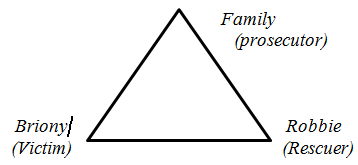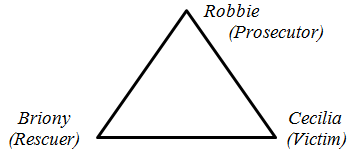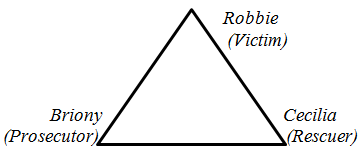According to Eric Berne, every person in his life plays many roles[1, 192p]. Even in medieval ages, Shakespeare wrote about it. On the basis of Berne’s investigations and theories Stephen B. Karpman puts forward his own theory, where he supposes that the roles, that every person plays are a victim, a rescuer and a prosecutor. This game Karpman has called “Drama Triangle” [2, 10p]. It means that everyone is involved in this game where he performs his role, sometimes even unintentionally. Any person can play different roles in various triangles simultaneously.
Briony, the main heroine of Atonement goes through all the stages of Drama Triangle during the novel. At first, she is a victim. She is a miserable 13 years old girl, whose mother suffers from migraine, lays in bed all the time complaining of wearisome heat, doesn’t pay much attention to her and her upbringing. Her father is constantly in downtown earns their living. Cecilia, her older sister studies in university and has diverse interests due to the age gap between them. Brother Leon also comes to visit the family on rare occasions because he is old enough to do what he prefers. Briony has a friend, Robbie, but he pays little attention to her as well.
“But her father remained in town, and her mother, when she wasn’t nurturing her migraines, seemed distant, even unfriendly”.
“Her play was not for her cousins, it was for her brother, to celebrate his return, provoke his admiration and guide him…”
The following scheme (triangle) illustrates the first triangle of the novel.

Briony plays the role of victim of the circumstances that were made by her family members and Robbie give her an opportunity to switch to his affairs.
As we can see from the examples, Briony is totally left alone with her ideas and lifetime dream of becoming a writer. Here she falls a victim of the circumstances, as every member of her family is busy with his or her own affairs.
Within the family Briony is a victim without no doubt, but in broader bounds Briony plays the other roles – she is a prosecutor and a rescuer inside the triangle with Cecilia and Robbie.
Due to the accidental circumstances, Briony becomes a witness of a quarrel between Robbie and Cee near the fountain.
“She (Cecilia) was out of her blouse, now she had let her skirt drop to the ground and was stepping out of it, while he looked on impatiently, hands on hips…Briony raised two hands to her face and stepped back a little way from the window. She should shut her eyes, she thought, and spare herself the sight of her sister’s shame”.
The following scheme illustrates the second triangle of the novel.

Briony plays the role of Cecilia’s rescue by gathering evidences against Robbie.
Despite the fact, that Briony is on her own, she is quite educated for her age and she is aware of the norms of behaviour. The girl knows that for her it would be better to be ignorant of the situation between her sister and her childhood friend. In the same time, Briony is a little girl full of girlish imaginations and she wants to be an author. Briony instantly creates a picture of Robbie as a brutal criminal who has some mysterious domination over her sister Cecilia. Interestingly, that in this very moment the entanglement of the novel’s plot takes place. The moment, when the girl starts suspecting Robbie of some offensive actions against her sister. The moment, when Briony breaks the rules of privacy and creates a triangle. In this triangle, Briony is a rescuer, Cee is a victim and Robbie is a prosecutor.
Everybody knows that for an Englishman privacy, ability to be alone means a lot, but forbidden fruit is sweet, and almost no one will lose the opportunity to pry into relatives’ or neighbours’ affairs [3, p 158 – 182]. Moreover, Briony does not consider this situation private, she perceives it like a fortune to help Cecilia and becomes a “kind rescuer” for her. Obsessed with this idea, Briony starts gathering evidences. To her luck, this very day, Robbie asks her to pass a note to Cee.
“Will you run ahead and give this note to Cee?”
“She had read the note standing shamelessly in the center of the entrance hall, immediately sensing the danger contained by such crudity. Something irreducibly human, or male, threatened the order of their household, and Briony knew that unless she helped her sister, they would all suffer. It was also clear that she would have to be helped in a delicate, tactful manner”.
As Briony starts suspecting Robbie in malicious intentions she opens and reads the note in the hope of finding the information she needs. The contents of the note was quite impressive and Briony decides to share it with her cousin Lola, who in that time suffers from her brothers’ bullies. They together try to find a solution to the problem, the way they cloud imprison Robbie. The ground finds itself. Later this evening Briony meets Cecilia and Robbie in the library.
“<…>where Briony was supposed to be — with her mother, and the brother she adored, and the little cousins. There was no good reason why she should be in the library, except to find him and deny him what was his. She had come looking for her sister—no doubt with the exhilarated notion of protecting her, or admonishing her, and had heard a noise from behind the closed library door”.
While all the family gathers to celebrate Leon’s return the twins Jackson and Pierrot manages to escape and the other family members have to find them. So they divide the territory to ease the task. Briony becomes lucky again. She does not find her cousins, but she comes across scene, that is difficult to interpret. She sees her cousin Lola and a man who tries to rape her. The girl immediately takes the man for Robbie.
“But she could not help watching as he mounted the slope quickly and without effort, and disappeared onto the roadway. She heard his footsteps as he strode toward the house. She had no doubt. She could describe him. Briony whispered, “Who was mof, “I saw him. I saw him”
The following scheme illustrates the last triangle of the novel.

Briony becomes Robbie’s prosecutor while she is gathering the information. Cecilia tries to help her lover, but fails.
Now Briony is guided by the conception of common sense, which is also occupies a lot in the British perception [3, p.158 – 182]. Taking into consideration all the facts, Briony is absolutely sure that this is Robbie.
From the rescuer for Cecilia Briony turns to a prosecutor for Robbie. Interestingly, that every rescuer has his or her own intentions, and if one intention is always clear, the other one is hidden. Briony’s case is not an exception. It is easy to understand that the girl warries for her sister and tries to help her. She does not think that Cecilia could do without her, she believes that Cecilia is in danger and she as her own sister must do whatever possible to warn her. The hidden intention might seem also vivid for a profound reader. For Briony Robbie was a close childhood friend. They use to spend a lot of time together and he taught her a lot. It is quite simple to guess, that the girl has some affection for Robbie and when she catches him with Cecilia, she gets upset and starts envying.
“They were on their way down to the river for the swimming lesson he had promised her <…> She may have been holding his hand”.
“Do you know why I wanted you to save me?”
“No.”
“Isn’t it obvious?”
“No, it isn’t.”
“Because I love you.”
<…> “What on earth do you mean by that?”
“I mean what everybody else means when they say it. I love you.”
<…> But it was difficult. He said, “You love me, so you threw yourself in the river.”
“I wanted to know if you’d save me.”
“And now you know. I’d risk my life for yours. But that doesn’t mean I love you”.
Robbie is the only boy in her environment who is not her relative; moreover, he is the only boy and the only one who pays attention to her. No wonder, that for a 13 years old girl their friendship means something different. That is the reason of her behaviour. Briony can consider the relationships between Robbie and Cecilia as a betrayal, even though she knows, that Robbie has no feelings towards her. Perhaps, for her it is a point of honour to revenge.
One more aspect of Briony’s characters opens up when it is reviewed from the point of its honesty. For an Englishman the concept of fair play is one of the most important. Its history begins together with the cricket, the game dates back to sixteen century and still is embodied in British culture [4, p 87]v. It is clear that late in the night Briony cannot be sure whether she saw Robbie, or someone else. She just wants to be so, she is guided by the feeling of revenge and considers her actions correct, because while from one hand she takes revenge, from the other hand she rescues Cecilia. Briony does not take into consideration that she can misinterpret the events and that it is not fair to affirm what she does not know for sure. It turns out that she simply lies justifying herself that she makes it for good.
After all events, that take place in Briony’s life she becomes a victim again, but now she is a victim of her own actions. In the end of the book we can clearly observe, that Briony is very miserable old lady who realized her faults too late, who didn’t find courage to apologize to Cecilia and Robbie for their broken lives, who didn’t atone her sins.
References
- Berne Е. Games People Play: The Psychology of Human Relationships. Grove Press, 1964 – 192p.
- Stephen B. Karpman “The New Drama Triangles USATAA/ITAA Conference Lecture” (PDF). karpmandramatriangle.com. Retrieved August 11, 2007 – 10p.
- Цветкова М. В. Английское / М. В. Цветкова // Межкультурная коммуникация. – Н. Новгород, 2001. – С. 158 -182
- Концепт “fair play” в английской национальной ментальности. Материалы ІІІ-й межкультурной научной конференции Филология и культура. Часть 2. – Тамбов, 2001. –С. –87.
- Ian McEwan, Atonement. Vintage, 2001 – 371p.

 View this article in Russian
View this article in Russian